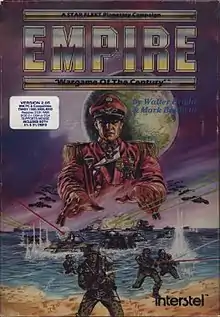 | |
| Developer(s) | Walter Bright and Mark Baldwin |
|---|---|
| Publisher(s) | Interstel Corporation |
| Platform(s) | Amiga, Apple II, Atari ST, Commodore 64, DOS, Macintosh |
| Release | 1987 |
Empire: Wargame of the Century is a video game based on Empire developed by Walter Bright and published by Interstel Corporation in 1987.
Development
Walter Bright recoded his 1977 mainframe game Empire in C on an IBM PC. With low commercial expectations, he submitted an announcement to January 1984 BYTE magazine's "Software Received" section, and received a flood of orders. After writing to many software companies (including Broderbund, Sirius Software, Simon & Schuster, Sublogic, Epyx, and MicroProse), he licensed the game to a small software company named Interstel. Mark Baldwin was brought in to coauthor the game redesigning it for the commercial market. Starting around 1987, Empire: Wargame of the Century on the Atari ST, Amiga, Commodore 64, Apple II, Macintosh, and DOS was produced. Interstel warned customers "Don't buy Empire! It is a Krellan plot to reduce productivity".[1]
Reception
Computer Gaming World stated that Empire was "a fascinating grand strategic wargame, more sophisticated than Risk, but easier to play than Third Reich".[1] The magazine's full review noted the improved UI, saying "the playability of an already successful system has been significantly enhanced".[2] The game would later receive the magazine's "Game of the Year" award for 1988;[3] in 1989 the magazine named Empire to its Hall of Fame for games readers rated highly over time, with a final score of 9.71 out of 12,[4] in 1990 readers voted for the game as their "All-Time Favorite",[5] a 1991 magazine survey of strategy and war games gave it four and a half stars out of five,[6] and a 1993 survey in the magazine gave the game three stars out of five.[7] Compute! agreed with the warning on the game box of its addictiveness, stating that the game combined aspects of exploration and strategy. The magazine also praised the UI, and concluded "this is a superb, addictive game".[8] Jerry Pournelle of BYTE also agreed about its addictiveness. While stating that the UI could be improved, he noted that Empire avoided the need to micromanage units that made games like Anacreon: Reconstruction 4021 tedious. Pournelle concluded that Empire "tempts you to play a little longer and find out what's going to happen next".[9] The Atari ST version of the game was reviewed in 1988 in Dragon #131 by Hartley, Patricia, and Kirk Lesser in "The Role of Computers" column. The reviewers gave the game 4 out of 5 stars.[10] The Lessers reviewed the MS-DOS version of the game in 1989 in Dragon #142, and gave the game 4 out of 5 stars.[11]
Reviews
- ASM (Aktueller Software Markt) – March 1988[12]
- ACE (Advanced Computer Entertainment) – October 1988[13]
- Computer Gaming World – November 1991
References
- 1 2 "Christmas Buyers Guide". Computer Gaming World. No. 41. November 1987. p. 24.
- ↑ Kritzen, William (January 1988). "Empire: The Rise and Fall of Random Empires". Computer Gaming World. pp. 40–42.
- ↑ "Computer Gaming World's 1988 Game of the Year Awards". Computer Gaming World. October 1988. p. 54.
- ↑ "Game Rating Chart". Computer Gaming World. May 1989. p. 56. Retrieved 3 November 2013.
- ↑ "CGW Readers Select All-Time Favorites". Computer Gaming World. January 1990. p. 64. Retrieved 15 November 2013.
- ↑ Brooks, M. Evan (November 1991). "Computer Strategy and Wargames: The 1900-1950 Epoch / Part I (A-L) of an Annotated Paiktography". Computer Gaming World. p. 138. Retrieved 18 November 2013.
- ↑ Brooks, M. Evan (September 1993). "Brooks' Book of Wargames: 1900-1950, A-P". Computer Gaming World. p. 118. Retrieved 30 July 2014.
- ↑ Randall, Neil (March 1988). "Empire". Compute!. p. 26. Retrieved 10 November 2013.
- ↑ Pournelle, Jerry (January 1989). "To the Stars". BYTE. p. 109.
- ↑ Lesser, Hartley; Lesser, Patricia; Lesser, Kirk (March 1988). "The Role of Computers". Dragon (131): 78–86.
- ↑ Lesser, Hartley; Lesser, Patricia; Lesser, Kirk (February 1989). "The Role of Computers". Dragon (142): 42–51.
- ↑ "Aktueller Software Markt (ASM) Magazine (April 1988)". April 1988.
- ↑ "ACE Magazine Issue 13". October 1988.